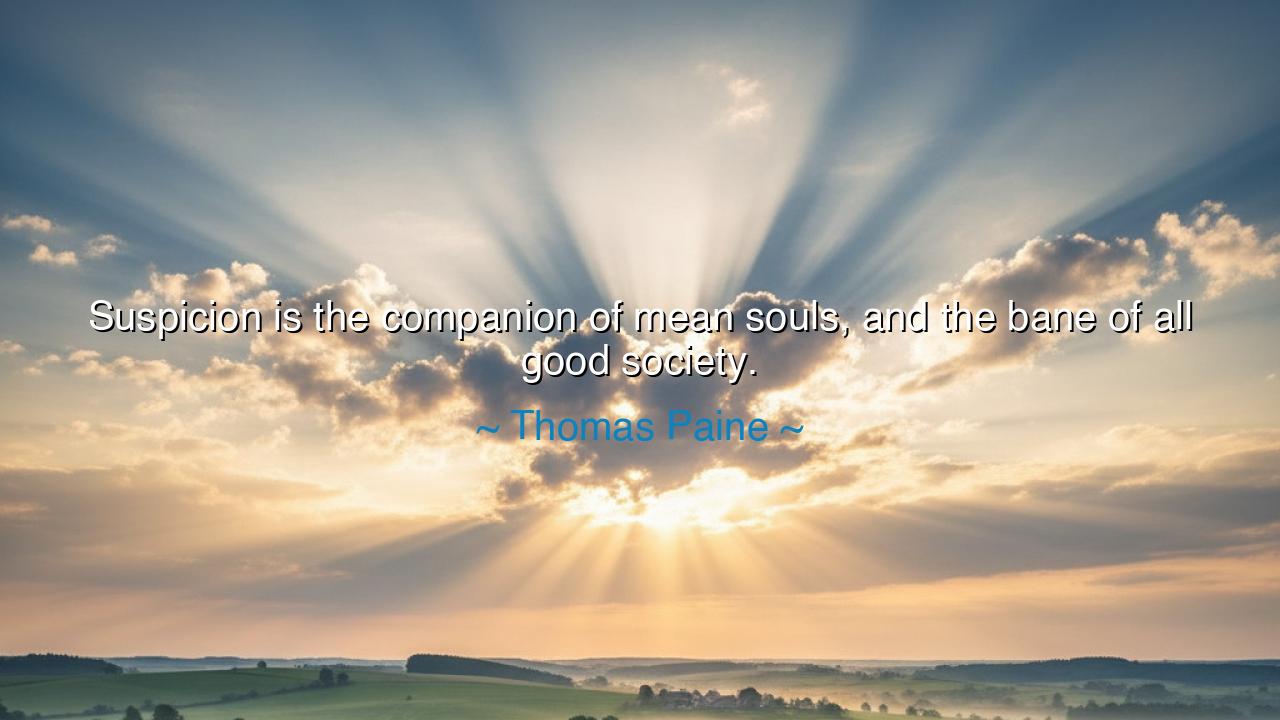
Suspicion is the companion of mean souls, and the bane of all






Hear the piercing words of Thomas Paine, the voice of revolution and reason: “Suspicion is the companion of mean souls, and the bane of all good society.” In this truth, he unmasks one of the silent destroyers of human fellowship. For when suspicion rules, trust withers; when distrust takes root, love and unity falter. Suspicion is the shadow cast by fear and envy, the mark of the small and insecure spirit. It thrives where hearts are narrow and courage is absent, and wherever it spreads, society decays from within.
The ancients spoke often of this poison. In the courts of kings, suspicion crept like a serpent, whispering lies into the ears of rulers. Many a noble man and woman were cast into chains or slain, not for guilt proven, but for suspicion alone. Thus Paine declares it the bane of all good society, for a people cannot flourish where every neighbor sees in another a rival or traitor. Good society is built upon trust, upon the strength of open hearts, and suspicion gnaws at these foundations until nothing remains but fear and division.
Consider the story of the Salem Witch Trials in early America. A community, once bound together, became consumed by suspicion. Innocent men and women were accused of witchcraft, condemned not by evidence but by fear and malice. Suspicion turned neighbor against neighbor, friend against friend, until the village was drowned in sorrow and regret. This tragic tale reveals the full force of Paine’s warning: suspicion breeds hysteria, injustice, and the collapse of the very bonds that hold society together.
Suspicion, Paine tells us, is the mark of mean souls—those whose hearts are small, who cannot see greatness in others without feeling threatened. The generous spirit trusts until given reason to doubt; the mean spirit doubts until forced to trust. In this way, suspicion is the mirror of insecurity, the outward sign of inward weakness. A good society requires courage of heart, but suspicion drains courage and replaces it with cowardice cloaked in caution.
Yet, we must not confuse wisdom with suspicion. To be discerning is noble, but to live in constant mistrust is ruinous. The wise man tests words and actions, yet he does not let fear cloud his judgment. Suspicion is not discernment—it is fear masquerading as wisdom. Paine calls us, then, to cast off this false armor and to live instead with the courage to trust, to hope, and to build relationships upon truth rather than fear.
The lesson is clear: if you would nurture a good society, guard against suspicion in your heart. Speak honestly, judge fairly, and extend trust generously. Refuse to let envy or fear govern your dealings with others. Where trust flourishes, society grows strong; where suspicion reigns, society crumbles. A house built on suspicion is already in ruins, but a community built on trust can withstand the storms of ages.
Therefore, O listener, let Paine’s words echo within you: “Suspicion is the companion of mean souls, and the bane of all good society.” Cast out suspicion where it creeps into your home, your friendships, your community. Choose to trust where trust can be given, and choose to seek truth where doubt arises. In this way, you build not only peace in your own heart but also strength in the larger body of society. Trust is the seed; justice is the fruit. Without it, no society can stand.
And so, let this teaching endure: suspicion is a chain for the weak, but trust is the freedom of the strong. Cultivate trust, banish suspicion, and you will walk the path of those who build, rather than destroy, the fellowship of mankind.






AAdministratorAdministrator
Welcome, honored guests. Please leave a comment, we will respond soon